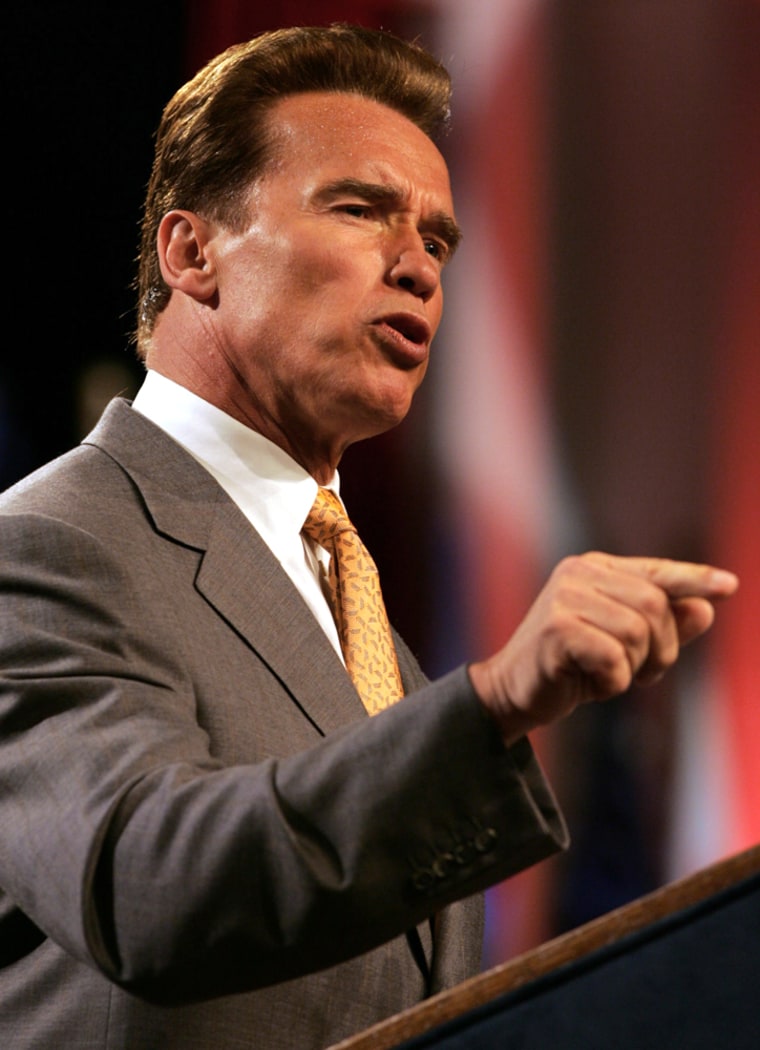Borrowing the kind of apocalyptic language used by the warrior characters that made him one of Hollywood's biggest stars, Gov. Arnold Schwarzenegger is about to decide whether to embark on "the great battle."
He has until Monday to call a special election in November to let the voters of California decide whether to clamp down on spending, change the way electoral districts are drawn and make it harder for teachers to win tenure.
Unable to get his way with the Legislature, the Republican governor has been threatening for months to take his case straight to the voters who brought him to power in 2003 in a recall election.
On his side are anti-tax conservatives and business interests; on the other, the state's majority party, the Democrats, and some of California's powerful unions, including teachers and other public employees.
"This is the nuclear war we've been dreading and screaming about and trying to avoid," said Steve Maviglio, spokesman for Assembly Speaker Fabian Nunez, a Los Angeles Democrat.
The outcome of the special election could set the tone for the rest of Schwarzenegger's term and, some say, perhaps even determine whether he runs again in 2006.
"In his early months, Schwarzenegger built up a great deal of political momentum," said Jack Pitney, a government professor at Claremont McKenna College in Southern California. "In recent months, he's had some difficulty. The special election will either restore his momentum or increase his problems."
But after three statewide elections in the past two years, voter fatigue may be setting in.
Spending money to make money
A recent poll by the Public Policy Institute of California found that 62 percent of likely voters opposed plans for a special election. California's county governments are asking the state to cover the election's $70 million to $80 million cost.
The most controversial of Schwarzenegger's three proposals is a spending cap that would impose automatic cuts if revenue fell below projected income. It would do away with a voter-approved 2000 measure that sets a minimum funding requirement for public schools. The governor insists the measure is crucial for returning California to fiscal health after years of deficit spending.
He also wants legislative and congressional districts to be drawn by a panel of retired judges, which Schwarzenegger hopes will send more moderates to Sacramento.
And he wants to extend from two years to five the amount of time teachers would have to work to get tenure.
The governor has said that he wanted to work out compromises with lawmakers on all three ideas, but that the Democrats have been unwilling to bargain.
"The public employees were not interested in a compromise with Schwarzenegger," Republican consultant Kevin Spillane said. "Their goal was not to negotiate but destroy him."
The Democrats said it is the governor who has not seriously considered alternatives.
Still, some hold out hope for a compromise in the next few months, even if Schwarzenegger signs an executive order calling the election.
"I'm always hopeful," said Assemblyman Kevin McCarthy of Bakersfield, the Republican minority leader. "But I have not seen any movement from them."
As for what may happen beyond Nov. 8, Spillane said: "Schwarzenegger is not someone who likes to go out on the down slope. If he loses in the special election, I think it would increase the chances that he runs again. If he wins, he might declare victory and walk away."
